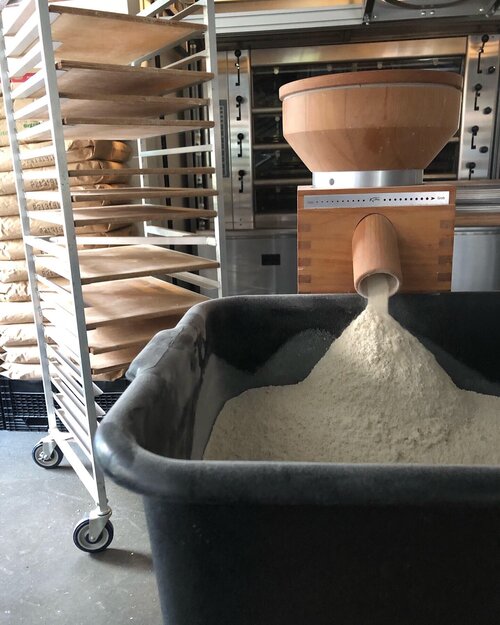Want to maximise the success rate of your sourdough? Or learn how to boost the nutrition of your next loaf? Perhaps you wish to use more sustainable ingredients in your baking this year?
Then our nifty guide to sourdough flour will show you which type you’ll knead to produce your ideal loaf…get it?
Ok, let’s get started with some of your frequently asked questions about sourdough flour:
Which flour is best for sourdough?

The beauty of sourdough is that you can just about get away with using most wheat- or cereal-grain based flours. With the right conditions and a pinch of patience, your sourdough starter will usually come alive. In the words of Jeff Goldblum (acting as Malcolm in Jurassic Park):
“Life, uh, finds a way”
Nevertheless, each flour type will have distinct effects on the development of your starter and the results of your bake. You may also need to adjust hydration levels accordingly.
In other words, there’s no easy answer to which is the best sourdough flour. But, if you’re a complete beginner, you may want to start by using strong white bread flour made from wheat. Thanks to it’s fine texture, average water absorption properties, and high levels of protein, this will provide you with:
- The easiest dough to knead and shape
- The best gluten development
- The greatest rise in the oven
Buy our favourite strong white bread flour for instore pickup here.

Once you’ve learned the basics of sourdough, perfected your technique and baked a few successful loaves of bread, you can try using other flours.
Why use different types of flour to bake sourdough?
Experimenting with sourdough flour types will yield diverse results, including differences in starter development, workability, fermentation activity, hydration, taste, aroma, texture, nutrient content, and oven rise.
It’s fun to play around with your flour to produce variable outcomes and you may discover you prefer sourdough using as opposed to whole wheat, for example.
Whole wheat flour vs. white flour
Both whole wheat flour and white flour are made from milled wheat berries (the grain/kernel of the wheat plant) but the latter flour type is sifted to remove the bran and germ of the grain.
The bran is the outer part of the wheat berry and contains plenty of fibre, B vitamins, trace minerals and a small amount of protein. The germ is the embryo (sprouting area) of the wheat seed and is rich in healthy fats, B vitamins and trace minerals. The endosperm is the inner part of the wheat berry and contains plenty of protein, carbohydrates, iron, soluble fibre, and B vitamins.
Due to whole wheat flour containing all three parts of the grain, it contains higher levels of nutrients and will provide your sourdough with a more complex flavour profile. It will also have an impact on the texture and density of your loaf.
Bakers can experiment with mixing whole wheat flour together with white to produce sourdough with more flavour but a lighter texture.
Is stone ground flour worth the hype?
Over recent years, many sourdough bakers are reverting back to stone ground flour, where the wheat berries are ground between two circular stones. Before the industrial revolution, this was the traditional method for milling flour and was replaced by a much faster technique using large steel rollers.
Buy our favourite organic stone ground whole wheat flour for instore pickup here.

According to numerous scientific studies (Pagani, 2020 and Carcea, 2020), stone milling offers no significant nutritional advantage over roller milling – providing the flour isn’t sifted afterward.
However, stone ground flour presents other benefits. For example, bakers may wish to use it to add more texture to their sourdough. Be aware that the fermentation process may take longer and the dough will be more difficult to handle. You will also need to adapt the amount of water you use.
What other types of flour can I use in sourdough?
Any flour containing starch is suitable for a sourdough starter, since it is the sugar that the microbes feed on. Glutenous flours, such as spelt, einkorn, rye, and wheat, tend to work best. However, it’s possible to use gluten-free flours, including buckwheat, amaranth, brown rice, and teff, but these may need a little help at first, known as a boosted starter.
Buy our favourite organic stone ground spelt flour for instore pickup here.
Here’s a list of some of the most popular sourdough flours:
- Strong white bread flour
- Rye flour
- Buckwheat flour
- Whole wheat (wholemeal) flour
- All-purpose flour
- Einkorn flour
- Emmer flour
- Spelt flour
Can I use 00 flour to make sourdough?
00 flour is finely ground flour with a slightly lower gluten content than other flour types. While this is perfect for baking an Italian pizza crust, it’s not so great for sourdough. Of course, you could mix it in with other flours, but we recommend opting for one of the types we’ve listed above as you’ll get more flavour and depth.
Have you checked out our guide on how to make the perfect pizza yet?
